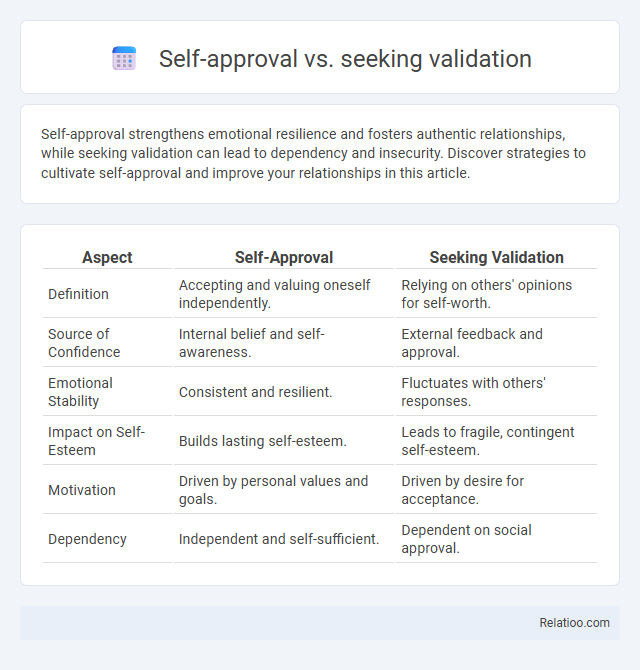Self-approval strengthens emotional resilience and fosters authentic relationships, while seeking validation can lead to dependency and insecurity. Discover strategies to cultivate self-approval and improve your relationships in this article.
Table of Comparison
| Aspect | Self-Approval | Seeking Validation |
|---|---|---|
| Definition | Accepting and valuing oneself independently. | Relying on others' opinions for self-worth. |
| Source of Confidence | Internal belief and self-awareness. | External feedback and approval. |
| Emotional Stability | Consistent and resilient. | Fluctuates with others' responses. |
| Impact on Self-Esteem | Builds lasting self-esteem. | Leads to fragile, contingent self-esteem. |
| Motivation | Driven by personal values and goals. | Driven by desire for acceptance. |
| Dependency | Independent and self-sufficient. | Dependent on social approval. |
Understanding Self-Approval and External Validation
Understanding self-approval involves recognizing your intrinsic worth without relying on external validation, which often leads to fleeting satisfaction and dependency on others' opinions. Your ability to cultivate self-approval strengthens emotional resilience and fosters genuine confidence, enabling healthier relationships and personal growth. Seeking validation from others may offer temporary comfort, but lasting fulfillment comes from embracing your own values and achievements internally.
The Psychology Behind Seeking Validation
Seeking validation stems from a deep-rooted psychological need for acceptance and reassurance from others, often linked to self-esteem and social belonging. Your reliance on external approval can hinder self-approval, which involves trusting your own judgment and intrinsic worth without depending on others' opinions. Understanding this dynamic empowers you to shift focus toward self-acceptance, fostering emotional resilience and authentic confidence.
Benefits of Cultivating Self-Approval
Cultivating self-approval enhances your emotional resilience by fostering inner confidence and reducing reliance on external validation, which can lead to more authentic decision-making and personal growth. Embracing self-approval improves mental well-being by diminishing anxiety linked to others' opinions and empowering you to navigate challenges with greater self-assurance. Developing this mindset encourages sustainable motivation and a healthier self-image, ultimately promoting long-term happiness and fulfillment.
Common Triggers for Validation Seeking
Common triggers for seeking validation often include feelings of insecurity, fear of rejection, and a deep need for acceptance from others. When you rely on external approval, your self-worth becomes vulnerable to fluctuating opinions and social feedback. Cultivating self-approval involves recognizing these triggers and building confidence through internal affirmation rather than seeking constant validation.
How Social Media Impacts Self-Worth
Social media platforms amplify the tendency to seek external validation, often causing your self-worth to fluctuate based on likes and comments rather than genuine self-approval. This external validation cycle undermines self-acceptance by prioritizing others' opinions over your intrinsic value. Cultivating self-approval independent of social media feedback is essential for maintaining authentic self-esteem and emotional resilience.
Self-Approval: Key to Emotional Resilience
Self-approval is a critical factor in developing emotional resilience, enabling individuals to trust their judgment and maintain self-worth without relying on external validation. Unlike seeking validation from others, which can create dependency and vulnerability to criticism, self-approval fosters internal stability and confidence in facing life's challenges. Cultivating self-approval supports mental health by promoting self-compassion, reducing anxiety, and enhancing overall emotional well-being.
Signs You May Be Dependent on External Validation
Signs you may be dependent on external validation include constantly seeking approval for your decisions, feeling anxious or upset when others criticize you, and being unable to make choices without consulting others. You might frequently compare yourself to peers or rely on social media likes to gauge your self-worth. This dependence contrasts with genuine self-approval, where confidence stems from internal values and personal achievements rather than others' opinions.
Shifting the Focus: Building Internal Validation
Shifting the focus from seeking external validation to cultivating self-approval empowers you to build lasting internal validation, fostering resilience and emotional stability. Emphasizing personal values and accomplishments over others' opinions strengthens your self-worth and reduces dependence on external affirmation. This internal shift enhances mindful decision-making and promotes authentic confidence in your abilities.
Strategies to Strengthen Self-Approval
Building self-approval involves cultivating inner confidence through consistent self-reflection, setting personal goals, and celebrating your achievements without relying on external validation. Strengthen your self-approval by practicing positive affirmations, embracing your imperfections, and developing resilience to criticism. Prioritizing your own values and beliefs helps maintain authenticity and reduces dependency on others' approval for your self-worth.
Balancing Healthy Relationships and Personal Validation
Balancing healthy relationships with personal validation requires distinguishing self-approval from seeking validation, as self-approval involves affirming your worth internally without relying on external judgment. Prioritizing self-approval fosters emotional resilience, reducing dependence on others' opinions and promoting authentic connections. Cultivating this balance enhances your ability to maintain relationships that support growth while safeguarding your self-esteem.

Infographic: Self-approval vs Seeking validation
 relatioo.com
relatioo.com